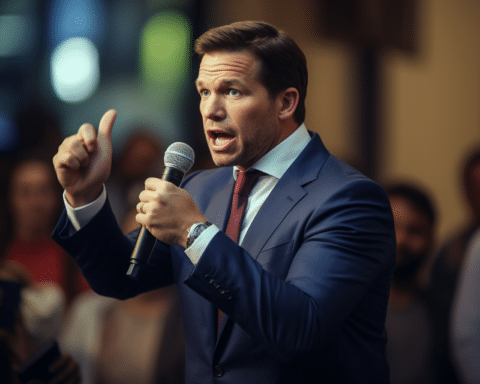The inaugural meeting of Walt Disney World’s newly restructured government, established through comprehensive legislation signed by Republican Governor Ron DeSantis in response to Disney’s public opposition to Florida’s “Don’t Say Gay” bill, addressed routine municipal concerns such as improved firefighter equipment, public records request procedures, and bond ratings.
However, the five DeSantis-appointed board members hinted at potentially controversial future actions, including the possibility of banning COVID-19 restrictions at Disney World and recommending the dissolution of two cities established after the Florida Legislature approved the theme park resort’s self-governance in 1967.
The board also approved hiring the same law firm that advised the governor’s office on changes to the governing district to assist with interpreting the new legislation.
Primarily, the new board members listened as the public and district department employees explained their roles in a hotel ballroom outside Disney World.
New board chair Martin Garcia stated that the main difference between the Disney-controlled old board and the DeSantis-appointed new board is a broader representation that includes a single company and the workers and residents of neighbouring communities.
Garcia added, “You didn’t elect us, but the people of Florida elected a governor who appointed us. I see there will be a much broader representation.”
The newly renamed Central Florida Tourism Oversight District’s other board members are Bridget Ziegler, a conservative school board member and wife of Florida Republican party chairman Christian Ziegler; Brian Aungst Jr., an attorney and son of a former two-term Republican mayor of Clearwater; Mike Sasso, an attorney; and Ron Peri, leader of The Gathering USA ministry.
These members replaced a board under Disney’s control for 55 years when the government operated as the Reedy Creek Improvement District.
District administrator John Classe informed the board that the new name would necessitate a new logo to replace the old one on 123 vehicles, 300 trash cans, and 1,000 manhole covers.
DeSantis and the Florida Legislature initiated the takeover of the Disney district last year after the entertainment company publicly opposed the “Don’t Say Gay” bill, which prohibits instruction on sexual orientation and gender identity in kindergarten through third grade, as well as lessons deemed age-inappropriate.
DeSantis promptly moved to punish Disney by instructing the Republican-majority Legislature to dissolve Disney’s self-governing district during a special legislative session, commencing a highly scrutinized restructuring process.
By confronting Disney, DeSantis reinforced his image as a culture warrior eager to challenge perceived political adversaries and utilize state government power to achieve political objectives, a tactic likely to persist as he potentially seeks a White House bid.
Following the meeting, Disney Parks, Experiences & Products chairman Josh D’Amaro expressed hope that the new board would uphold the high standards set by its predecessor for the resort’s infrastructure and support its continued growth.
During public comments at Wednesday’s meeting, the district’s firefighters’ union leader, who had previously clashed with the old board, welcomed the new members and described the new board as “a fresh start.” Jon Shirey urged the board to allocate resources for new fire trucks, enhanced pay, and increased staffing, noting that the current 32 firefighters on duty daily are just two more than the number in 1989.
Shirey emphasized, “It’s safe to say that Disney has grown exponentially.”
As the Central Florida Tourism Oversight District proceeds with its operations, various stakeholders and observers will closely monitor its decisions and actions. The board’s controversial appointments and potential future activities have raised concerns among community members.
Apart from the board’s suggested actions, such as prohibiting COVID-19 restrictions and dissolving two cities established in 1967, additional topics of interest may include employee benefits, environmental initiatives, and collaboration with other regional authorities.
Despite the uncertainty surrounding the board’s direction, some stakeholders, such as the district’s firefighters’ union, have expressed optimism about the potential for a fresh start and a broader representation of interests. This development could lead to improved working conditions, increased investment in public services, and a more inclusive decision-making process.
However, critics argue that the new board’s formation may have been politically motivated and that its actions could have influenced Governor DeSantis’ stance on various issues. As a result, the board’s decisions may sometimes prioritize the best interests of Disney World, its employees, or the surrounding communities.
The Central Florida Tourism Oversight District’s story highlights the complex interplay between politics, corporate interests, and public services. As the board navigates these challenges, its decisions will likely have significant implications for Disney World, its employees, and the wider community.




